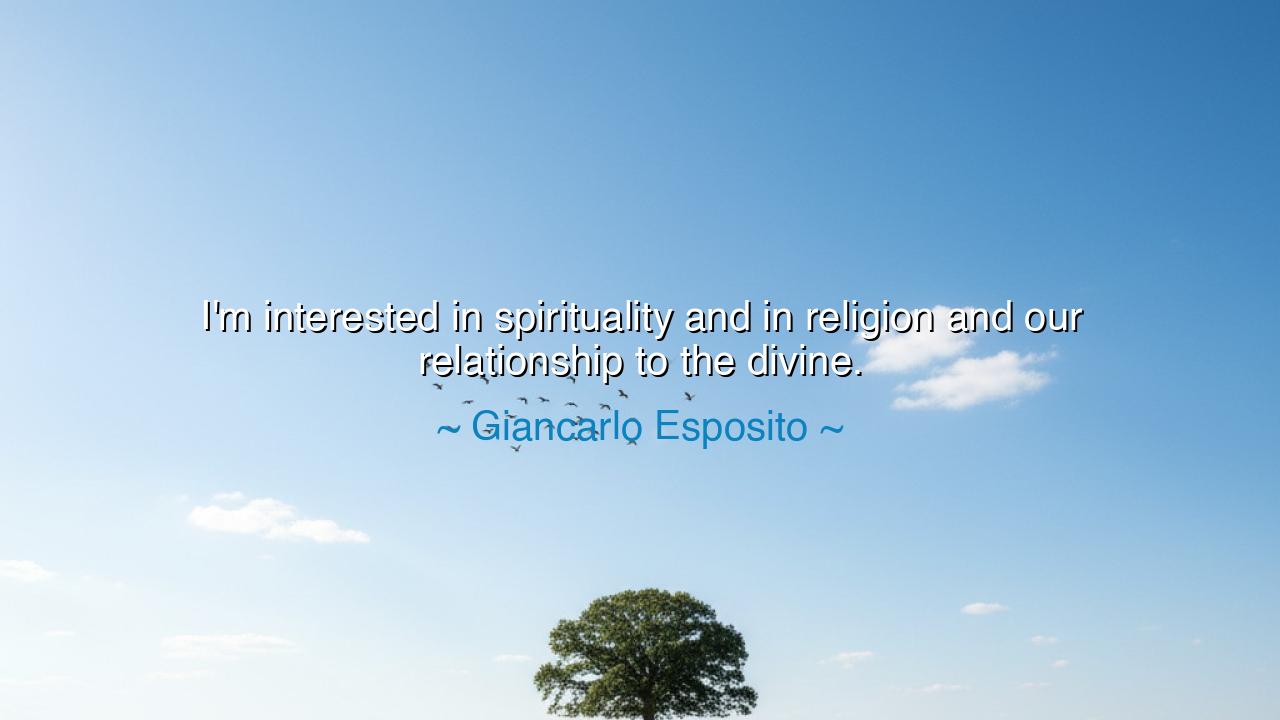
I'm interested in spirituality and in religion and our






Hear, O child of wonder, the words of Giancarlo Esposito: “I’m interested in spirituality and in religion and our relationship to the divine.” These words carry the tone of one who is both seeker and student, one who feels the pull of mystery yet does not claim final answers. They remind us that human beings are not satisfied with bread alone, nor with the turning of days, nor with the cold mechanics of the universe. We hunger for meaning, for connection, for the eternal thread that binds the soul to the stars.
Consider the difference between spirituality and religion. Spirituality is the flame within, the silent yearning of the heart that stretches toward the infinite. Religion is the vessel, the tradition, the community that shapes and guards that flame. Esposito’s words reveal a wisdom: that one without the other is incomplete. Spirituality without religion risks drifting into aimless longing; religion without spirituality risks hardening into lifeless ritual. But together, they form a bridge between earth and heaven, between human weakness and divine mystery.
The heart of his saying rests on “our relationship to the divine.” This relationship is not abstract, but personal and communal. To the ancient prophets, the divine was not a concept but a presence, a voice that thundered from the mountain or whispered in the stillness. To the mystics, it was a union that dissolved the self into greater love. To the common believer, it was a companion through suffering, a guide through the labyrinth of life. Esposito acknowledges that what matters most is not dogma alone, but the lived connection—how each person relates to that which is higher, greater, eternal.
History bears witness to this quest. Consider Rumi, the poet of Persia, who sang of God as the Beloved, weaving words that still ignite souls across centuries. His spirituality was bound to his religion, Islam, yet it transcended its borders, speaking to all who longed for love. Or recall St. Francis of Assisi, who saw the divine in the sun, the moon, the sparrow, and the leper. His relationship to God transformed him from wealthy youth to humble servant, and his faith ignited a movement of simplicity and compassion. These figures remind us that to seek the divine is the most ancient of human callings.
The meaning, then, is clear: Esposito’s words urge us to become seekers, not to accept the surface of life as enough. To be interested in spirituality, religion, and the divine is to recognize that life without transcendence becomes shallow, a story without depth. It is to remember that beyond our work, our struggles, and our pleasures lies a greater mystery—the question of why we are here, and how we are to live in harmony with what lies beyond ourselves.
The lesson for us is this: do not let your days pass without seeking. Ask the questions that stretch beyond comfort: What do I believe? What is sacred to me? How do I encounter the divine in my daily life? Do not fear doubt, for even doubt is a step on the path. But also do not close yourself off to faith, for faith is the hand that steadies you when reason falters. To cultivate both is to walk as a balanced soul.
Practical counsel follows. Set aside moments of stillness each day to listen—to your heart, to the world, to the divine whisper. Explore traditions, old and new, and let their wisdom shape you. Read the words of prophets, poets, mystics, and saints, not to adopt their every teaching, but to let them guide you deeper into your own search. Above all, live as though the divine is near, for when you treat each act of kindness, each breath of gratitude, each struggle for justice as sacred, then your relationship with the eternal becomes not theory, but life itself.
Therefore, O traveler of both earth and spirit, remember Giancarlo Esposito’s wisdom: be interested in spirituality, in religion, and in your relationship to the divine. For these are not luxuries but necessities of the soul. They are the compass and the flame, the map and the mystery, that guide humanity across the deserts of time. To neglect them is to walk blind; to embrace them is to walk awake, alive, and connected to the infinite.






AAdministratorAdministrator
Welcome, honored guests. Please leave a comment, we will respond soon